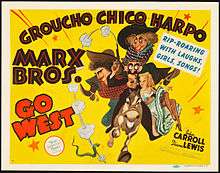
Go West (song)
"Go West" is a song by the American disco group Village People. It was an instant hit in the disco scene during the late 1970s. The song found further success when it was covered in 1993 by English synthpop duo Pet Shop Boys. Original Village People lead singer Victor Willis, Henri Belolo and Jacques Morali are credited as the song's writers, although Willis disputes Belolo's involvement.
Village People version
Originally released as a single in 1979, it was not as popular as the group's other contemporary singles such as "Y.M.C.A." and "In the Navy". The song's title is attributed to the nineteenth century quote "Go West, young man" commonly attributed to Horace Greeley, a rallying cry for the colonization of the American West. Though Victor Willis denies writing the song with a gay theme in mind, "Go West" is generally understood as an expression of the 1970s sentiment of San Francisco as a utopia for the Gay Liberation movement.
Both the 7" and 12" versions of the song were subsequently collected in various greatest hits collections, including a 1997 radio remix which was made in the wake of the success of Pet Shop Boys' 1993 version.
Go West
Go West may refer to:
Companies
Film, art and entertainment
Music
- Go West (Go West album), the band's first album in 1985
Songs

Go West (1940 film)
Go West (a.k.a. The Marx Brothers Go West) is the tenth Marx Brothers comedy film, in which brothers Groucho, Chico, and Harpo head to the American West and attempt to unite a couple by ensuring that a stolen property deed is retrieved. It was directed by Edward Buzzell and written by Irving Brecher, who receives the original screenplay credit.
Plot
Confidence man S. Quentin Quale (Groucho) heads west to find his fortune. In the train station, he encounters crafty brothers Joseph (Chico) and Rusty Panello (Harpo) who manage to swindle his money. The Panello's are friends with an old miner named Dan Wilson (Tully Marshall) whose property, Dead Man's Gulch, has no gold. They loan him their last ten dollars for a grub stake and he gives them the deed to the Gulch as collateral. Unbeknownst to Wilson, the son of his longtime rival and beau to his granddaughter Eve Wilson (Diana Lewis), Terry Turner (John Carroll) has contacted the railway to arrange for them to build through the land, making the deed holder rich.

Go West (exhibition)
Go West is the title of the first exhibition by Stuckist artists in a commercial London West End gallery. It was staged in Spectrum London gallery in October 2006. The show attracted media interest for its location, for the use of a painting satirising Sir Nicholas Serota, Director of the Tate gallery, and for two paintings of a stripper by Charles Thomson based on his former wife, artist Stella Vine.
Show
The Stuckists had previously been seen as art world outsiders, but with the backing of a West End gallery in a "major exhibition" became "major players" in the art world. Ten leading Stuckist artists were exhibited.
Royden Prior, the director of Spectrum London, said, "These artists are good and are part of history. Get past the art politics and look at the work."
Art critic Edward Lucie-Smith wrote in an essay for the show:
Rachel Campbell-Johnston, art critic of The Times, condemned the work as "empty of anything much" and "formulaic". Nevertheless, Thomson's and Joe Machine's paintings sold out, before the show opened, to buyers from the UK, Japan and the US.
Podcasts:

